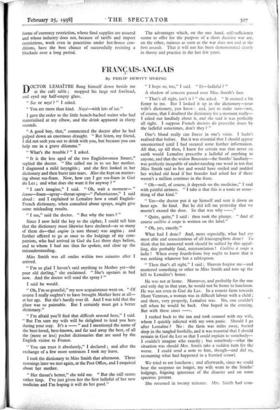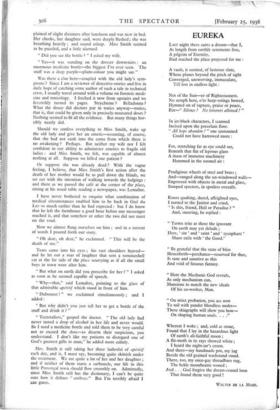FRANcMS-ANGLAIS
By PHILIP HEWITT MYRING
DOCTOR LEMATTRE flung himself down beside me at the café table ; mopped his large red forehead, and eyed my half-empty glass.
" Sec or noye?" I asked.
" You are more than kind. Noye—with lots of ice."
I gave the order to the little hunch-backed waiter who had materialised at my elbow, and the drink appeared in thirty seconds.
" A good boy, that," commented the doctor after he had gulped down an enormous draught. " But listen, my friend, I did not seek you out to drink with you, but because you can help me in a grave dilemma."
" What's the trouble ? " I asked.
" It is the less aged of the two Englishwomen Smeet," replied the doctor. " She called me in to see her mother. I diagnosed a mild laryngitis ; and she first looked in her dictionary and then burst into tears. Also she kept on mutter- ing about sea-foam. Now, how can I get sea-foam in Gue du Lez ; and what does she want it for anyway ? "
" I can't imagine," I said. " Oh, wait a moment— " ecume—foam—spray—throat-spray—" Pulverisateur," I said aloud : and I explained to Lemaitre how a small English- French dictionary, when consulted about sprays, might give some misleading results.
" I see," said the doctor. " But why the tears ? "
Since I now held the key to the cipher, I could tell him that the dictionary must likewise have declared—as so many of them do—that angine (a sore throat) was angina ; and further offered to go at once to the lodgings of my com- patriots, who had arrived in Gue du Lez three days before, and to whom I had not thus far spoken, and clear up the misunderstanding.
Miss Smith was all smiles within two minutes after I arrived.
" I'm so glad I haven't said anything to Mother yet—the poor old darling," she exclaimed. " She's upstairs in bed now. And the doctor will send the spray ? "
I said he would.
" Oh, I'm so grateful," my new acquaintance went on. " Of course I really oughtn't to have brought Mother here at all— at her age. But she's hardly ever ill. And I was told that the place was so paintable. But I certainly must get a better dictionary."
" I'm afraid you'll find that difficult around here," I said. " But I'm sure my wife will be delighted to lend you hers during your stay. It's a — " and I mentioned the name of the best-loved, best-known, and far and away the best, of all the (more or less) pocket dictionaries that are used by the English visitor to France.
" You can trust it absolutely," I declared ; and after the exchange of a few more sentences I took my leave.
I took the dictionary to Miss Smith that afternoon. Three mornings later we met again, at the Post Office, and I enquired about her mother.
" Her throat's better," she told me. " But she still seems rather limp. I've just given her the first ladleful of her new medicine and I'm hoping it will do her good." " I hope so, too," I said. " Er—ladleful ? "
A shadow of concern passed over Miss Smith's face.
" That's all right, isn't it ? " she asked. " It seemed a bit funny to me. But I looked it up in the dictionary—your wife's dictionary, you know : and, just to make sure—not, of course, that I doubted the dictionary for a moment really— I asked our landlady about it, and she said it was perfectly all right. I suppose French doctors do prescribe doses by the ladleful sometimes, don't they ? "
One's blood really can freeze in one's veins. I hadn't realised that before. But it was essential that I should appear unconcerned until I had secured some further information. All that, up till then, I knew for certain was that never on earth would Lemaitre prescribe a ladleful of anything to anyone, and that the widow Roussain—the Smiths' landlady— was perfectly incapable of understanding one word in ten that Miss Smith said to her and would have smiled and nodded her wicked old head if her boarder had asked her if there weren't a million centimes in the franc.
" Oh—well, of course, it depends on the medicine," I said with painful airiness. " I take it that this is a tonic or some- thing of that kind."
" Yes—the doctor put it up himself and sent it down an hour ago. So kind. But he did tell me yesterday that we mustn't exceed the dose. So that was why —."
" Quite, quite," I said : then took the plunge. " And of course cuillere a soupe is written on the label."
" Oh, yes, exactly."
What had I done? And, more especially, what had my most able and conscientious of all lexicographers done ? To think that his immortal work should be sullied by this appal- ling, this probably fatal, mistranslation ! Cuillere a soupe a ladle ! When every fourth-form boy ought to know that it was nothing whatever but a tablespoon.
" Then that's all right," I said ; Heaven forgive me—and muttered something or other to Miss Smith and tore up the hill to Lemaitre's house.
He was not at home. Moreover, and probably for the one and only day in that year, he would not be home to luncheon. He was not even in Gue du Lez. In a remote farm towards Mont Ventoux, a woman was in difficult labour with a child ; and there, very properly, Lemaitre was. No, one couldn't tell when he would be back. One hoped in the evening. But with these cases —.
I rushed back to the inn and took counsel with my wife, whom I quickly infected with my own panic. Should I go after Lemaitre ? No : the farm was miles away, buried deep in the tangled foothills, and it was essential that I should remain in Gue du Lez so that I could explain to somebody— I couldn't imagine who exactly ; but somebody—what the situation was should Mrs. Smith take a sudden turn for the. worse. I could send a note to him, though—and did so, recounting what had happened in a hurried scrawl.
We tried to eat luncheon ; and afterwards, since we could bear the suspense no longer, my wife went to the Smiths' lodgings, feigning ignorance of the disaster and on some specious pretext.
She returned in twenty minutes. Mrs. Smith had com- plained of slight dizziness after luncheon and was now in bed. Her cheeks, her daughter said, were deeply flushed; she was breathing heavily ; and sound asleep. Miss Smith seemed to be puzzled, and a little alarmed.
" Did you see the bottle ? " I asked my wife.
" Yes—it was standing on the dresser downstairs : an enormous medicine bottle—the biggest I've ever seen. The stuff was a deep purple—plum-colour you might say."
Was there a clue here—coupled with the old lady's sym- ptoms? Since I am a reviewer of detective-stories and live in daily hope of catching some author of such a tale in technical error, I usually travel around with a volume on forensic medi- cine and toxicology. I fetched it now from upstairs and we feverishly turned its pages. Strychnine ? Belladonna ? What the deuce did doctors put in tonics anyway—tonics, that is, that could be given only in precisely-measured doses ? Nothing seemed to fit all the evidence. But many things hor- ribly nearly did.
Should we confess everything to Miss Smith, wake up the old lady and give her an emetic—assuming, of course, that she had not sunk into the coma from which there is no awakening ? Perhaps. But neither my wife nor I felt confident in our ability to administer emetics to fragile old ladies : and Miss Smith, we felt, was capable of almost nothing at all. Suppose we killed our patient ?
Or suppose she was already dead ? With the vague feeling, I believe, that Miss Smith's first action after the death of her mother would be to pull down the blinds, we set out with the intention of walking towards the lodgings : and there as we passed the café at the corner of the place, sitting at his usual table reading a newspaper, was Lemaitre.
I have never bothered to enquire what combination of medical circumstances enabled him to be back in Gue du Lez so much earlier than he had expected : but I do know that he left the farmhouse a good hour before our messenger reached it, and that somehow or other the two did not meet on the road.
Now we almost flung ourselves on him ; and in a torrent of words I poured forth our story.
" Oh dear, oh dear," he exclaimed. " This will be the death of me."
Tears came into his eyes ; his vast shoulders heaved— and he let out a roar of laughter that sent a tortoiseshell cat at the far side of the place scurrying as if all the small boys in town were after him.
" But what on earth did you prescribe for her ? " I asked as soon as he seemed capable of speech.
" Why—that," said Lemaitre, pointing to the glass of that admirable aperitif which stood in front of him.
" Dubonnet ! " we exclaimed simultaneously ; and I • added : " But why didn't you just tell her to get a bottle of the stuff and drink it ? "
" Teetotallers," gasped the doctor. " The old lady had never tasted a drop of alcohol in her life and never would. So I used a medicine bottle and told them to be very careful not to exceed the dose—to disarm their suspicions, you understand. I don't like my patients to disregard one of God's greatest gifts to man," he added more calmly.
Mrs. Smith is still taking her three ladlesful of aperitif each day, and is, I must say, becoming quite skittish under the treatment. We see quite a lot of her and her daughter ; and if neither of them starts a carbuncle, our life in this little Provençal town should flow smoothly on. Admittedly, since Miss Smith still has the dictionary, I can't be quite sure how it defines " anthrax." But I'm terribly afraid I can guess.

















































 Previous page
Previous page